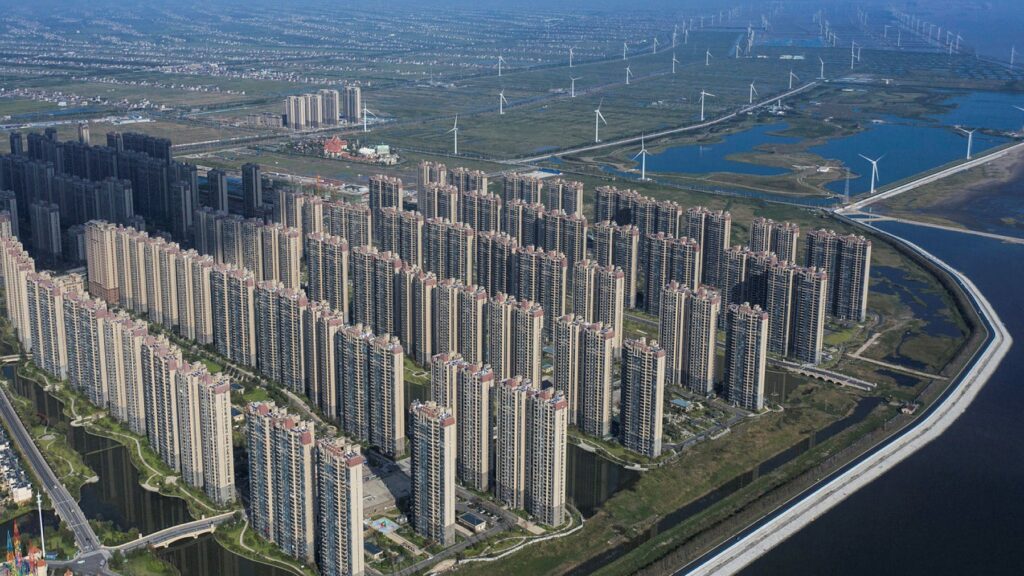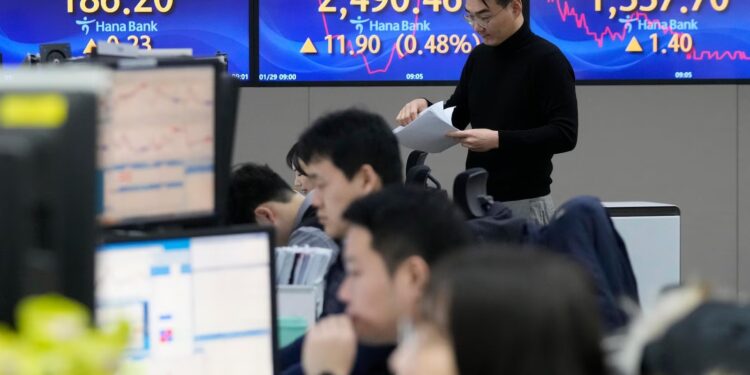Asian markets have opened the week on a positive note after Wall Street closed another winning week with a mixed finish
Asian markets opened the week on a positive note, with Chinese regulators announcing measures to support the country’s teetering stock markets while heavily indebted property developer China Evergrande was ordered to undergo liquidation.
U.S. futures were lower while oil prices gained.
China’s securities regulator announced on Sunday that beginning Monday, China will suspend the lending of specific shares for short selling, a move to support the country’s declining stock markets. The specific shares refer to Restricted Stock, which is typically allocated to employees or certain investors subject to sales restrictions.
The Hang Seng in Hong Kong added 0.9% % to 16,102.02 and the Shanghai Composite index was up 0.3% at 2,918.81.
China Evergrande Group will be liquidated after a Hong Kong High Court approved a creditor petition on Monday. The heavily indebted developer repeatedly had asked authorities to grant it more time to work out a resolution for its offshore debts. Evergrande has more than $300 billion in liabilities and can appeal the order.
Tokyo’s Nikkei 225 index climbed 1.1% to 36,121.09. In South Korea, the Kospi jumped 1.5% to 2,507.50.
Australia’s S&P/ASX 200 was 0.3% higher to 7,576.60. In Bangkok, the SET rose 0.2%.
On Friday, the S&P 500 slipped 0.1% to 4,890.97. It was its first decline after a six-day winning streak.
The Dow Jones Industrial Average rose 0.2% to 38,109.43. Weakness for tech stocks dragged the Nasdaq composite to a loss of 0.4% to 15,455.36.
Intel led chip stocks lower even though it reported stronger profit for the last three months of 2023 than analysts expected. It dropped 11.9% after giving forecasts for revenue and profit for the start of 2024 that fell short of Wall Street’s estimates.
KLA, a supplier for the chip industry, also dragged on tech stocks despite reporting better quarterly results than expected. It sank 6.6% after saying it still sees market conditions as challenging in the near term and giving a forecast for upcoming revenue that fell short of analysts’ estimates.
The latest report on Friday showed the measure of inflation the Fed prefers to use behaved just about exactly as expected in December. Overall inflation by that measure was 2.6% during the month, matching November’s rate.
The Fed pays more attention to the inflation figure after ignoring prices for food and fuel, which can zigzag sharply month to month. That figure cooled to 2.9% from 3.2% and was a bit better than economists expected.
At the same time, spending by U.S. consumers strengthened by more in December than expected. That helped calm worries that a resilient U.S. economy, which has so far refused to fall into a long-predicted recession, would mean upward pressure on inflation.
Treasury yields yo-yoed in the bond market following the report but later rose modestly. On Monday, the yield on the 10-year Treasury edged up to 4.13% from 4.12% late Friday.
The Federal Reserve’s meeting this week will likely end with no change to interest rates, but traders are split on whether it could begin cutting rates in March. That would be a sharp turnaround from the last two years, when the Fed hiked its main interest rate to the highest level since 2001. It’s trying to slow the economy and hurt investment prices enough through high interest rates to get inflation fully under control.
Traders are betting the Fed will cut interest rates as many as six times this year, according to data from CME Group. That would be double what the Fed itself has indicated.
Critics say that overzealousness may be setting financial markets up for disappointment after their big rallies in recent months.
For now, though, the mood is still mostly ebullient.
In energy trading, benchmark U.S. crude rose 44 cents to $78.45 a barrel in electronic trading on the New York Mercantile Exchange. Brent crude, the international standard, added 46 cents to $83.41 a barrel.
Source: abcNEWS
Background
Evergrande crisis and its impact on the Chinese real estate market
The Evergrande crisis has sent shockwaves through the Chinese real estate market, raising concerns about the stability of one of the world’s largest property developers. Evergrande, once a symbol of China’s economic boom, is now grappling with a staggering debt of over $300 billion, sparking fears of a potential financial meltdown.

Evergrande’s troubles began as a result of its aggressive expansion strategy, fueled by heavy borrowing. The company invested in various sectors beyond real estate, including electric vehicles and tourism, accumulating a massive debt burden. China’s regulatory crackdown on excessive borrowing and the real estate sector’s speculative practices exacerbated Evergrande’s financial woes.
The real estate giant’s struggle to meet its debt obligations has raised questions about the broader implications for the Chinese property market. The real estate sector plays a crucial role in China’s economy, accounting for a significant portion of GDP and providing employment to millions. A potential collapse of Evergrande could have a cascading effect, leading to a slowdown in construction activity, a decline in property prices, and a ripple effect on related industries.
In response to the crisis, the Chinese government has implemented measures to mitigate the impact on the broader economy. Authorities have urged local governments to stabilize the property market, control speculation, and ensure the delivery of housing projects. Additionally, there are efforts to encourage mergers and acquisitions within the real estate sector to prevent further defaults.
Investors, both domestic and international, are closely monitoring the situation. The Evergrande crisis has highlighted the need for increased scrutiny and oversight in the Chinese real estate market to prevent similar issues in the future. The government’s commitment to financial stability and its efforts to address the root causes of the crisis will play a crucial role in determining the long-term health of the Chinese real estate market.
In conclusion, the Evergrande crisis has exposed vulnerabilities in China’s real estate sector and raised concerns about the broader economic impact. The Chinese government’s response and its ability to stabilize the market will be critical in determining the future trajectory of the country’s real estate industry.




Recent Comments